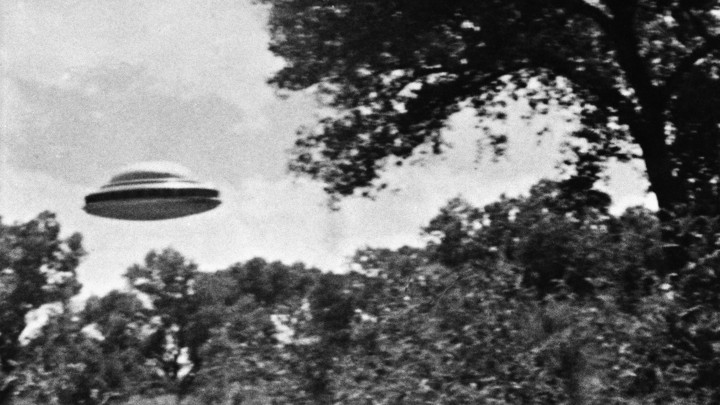What UFOs Mean for Why People Don't Trust Science
“I have thought all the known quantities over in the case of these objects and arrive at a not too unreasonable answer. The answer is that these objects are unknown, definitely and positively.”
So said a U.S. Air Force sergeant in 1953, trying to explain to investigators (and, I suspect, to himself), what he had seen, standing on a roof on an August night, watching three well-lit, color-changing objects fly by. His statement, which can be read on Project Blue Book Archive, a site devoted to supporting “serious UFO research,” gets at a fundamental misunderstanding of the people who believe in UFOs—that they are anti-science.
Vote for a local nonprofit you love.
Meet the 15 finalists driving change in their communities—and help decide who will win $20,000 in funding.
In a recent paper published in Public Understanding of Science, Greg Eghigian, an associate professor of modern history at Penn State University, traces the history of ufology and its relationship with mainstream science, arguing that the mistrust between the two was not because ufologists were ignorant about science. And his analysis holds lessons for understanding other beliefs that run counter to scientific evidence.
Take the Air Force guy—maybe he was an amateur ufologist, or maybe he was just a person who saw something in the sky he couldn’t explain, but he hardly seems to be spouting blind, irrational belief. Rather, he seems to be trying for a Sherlock Holmesian deduction—he’s reviewed the “known quantities” and is trying to arrive at the most logical answer he can, which is that “this was something that I have never seen before or since.”
Many ufologists, Eghigian says, have tried to go about their inquiries logically and systematically, usually by one of two methods. They would either come up with ways to code reports of UFO sightings so they could be statistically analyzed, or they would do detailed case studies.
“These folks were trying to do what scientists do,” he says. “They were trying to model and mimic all the trappings of scientific practice.”
But from the beginning, mainstream science was not welcoming to hypotheses about UFOs, especially not that they could be extraterrestrial in origin. When the first reports of disks and strange lights in the sky appeared in the years after World War II, several governments did collect and analyze these stories. The U.S. Central Intelligence Agency theorized that they could be foreign weapons, or maybe a mass hysteria, (“midsummer madness,” officials said in 1952) that could be another kind of security threat.
A few academics engaged with the UFO question (the University of Colorado psychologist David Saunders came up with a widely-used coding system, for one), but not many. For the most part, academia saw the study of UFOs as illegitimate.
This viewpoint was solidified when a University of Colorado commission on UFOs released a report in 1968, writing “nothing has come from the study of UFOs in the past 21 years that has added to scientific knowledge.” After that, though not solely because of it, the U.S. Air Force stopped studying UFOs, and with the notable exception of the Search for Extraterrestrial Intelligence (SETI), the natural sciences mostly left aliens alone, too.
But the human sciences started to take an interest starting in the 1970s (though there had been a few studies in earlier decades), not in identifying the flying objects but in identifying what made people believe in them. I asked Eghigian if it changed at all the nature of the mistrust between the two groups, that ufologists had finally started to get attention from mainstream scientists, but it was their persons rather than their hypotheses that were the objects of study.
“It’s a good question to ponder,” he says. “Offhand my initial instinct would be to say that all it did was to reinforce a sense of frustration.”
“I do think it’s very interesting,” he adds, “that the phenomenon of talking about alien abduction by and large really only takes shape and gets any kind of momentum in the 1970s and 1980s … Once academic science starts to talk about believers as subjects for experimental investigation or clinical analysis that’s when you start to see more strings of reports of alien abduction, which tend to involve what? Human experimentation.”
So while it would be wrong to say that ufologists were anti-science, they had plenty of reason not to trust scientists and scientific institutions. Being written off as delusional, and only interesting because you’re delusional is surely frustrating. And the “institutional isolation” of ufologists, Eghigian writes, “has only served to reinforce their view that academic and political authorities are, at best, narrow-minded or, at worst, engaged in a deliberate attempt to hide information.”
The secrecy with which the U.S. government and others conducted their initial UFO investigations, while understandable considering their worries that the objects were a national security threat, may have only made believers think there was something to hide.
This sort of actual, intentional secrecy is likely rare, but there are plenty of barriers to understanding that to the right (or wrong) mindset could read as suspicious. For one, many academic journals aren’t open access, so the layperson researching on Google likely wouldn’t be able to read the scientific studies for themselves. And even if they could, the statistical methods and jargon scientists use in their writing could be hard to parse.
For example, “in the natural sciences, the way you instruct is basically through mathematics, and forms of mathematics that are absolutely inaccessible to the vast majority of us,” Eghigian says. “That’s, I think, relatively natural. Perhaps it’s downright unavoidable. But for the general public, that impenetrability of being able to know how to look under the hood—that creates problems. That may not to us academics look like secrecy but to others it does seem like we have our own secret language.”
And then there’s the fact that if you were to ask a scientist about UFOs, or whether vaccines are unsafe, or how to explain a case of seeming telepathy, chances are they’d “consider it professionally silly to even engage in this,” he says.
Not that scientists should be under any obligation to re-consider ideas which plenty of study has already found no evidence to support. But if lay people are occasionally guilty of not trusting scientists, so too are scientists guilty of not trusting lay people. Interest in UFOs has been on the decline since the 1990s, once the Cold War ended and its attendant anxieties about nuclear weapons and surveillance faded a little. But the history of ufology offers some insight into the nature of this mutual mistrust, that could have implications for other forms of mistrust in mainstream science.
“Most ufologists have been especially sensitive to the fact that scientific cynicism toward them seems to point to a hierarchical asymmetry at work,” Eghigian writes.
People with any sort of scientifically unsupported belief—anti-vaxers, climate-change deniers, believers in ESP—may feel they’re not being heard, that their concerns aren’t being addressed. Scientists may feel that their concerns don’t deserve to be addressed, that giving any attention to these incorrect ideas gives them too much legitimacy. So the trust between science and the public can curdle in places.
As my colleague Emma Green smartly noted in her recent piece on anti-vaxers, mistrust in science can come from “the monolithic power of science as a source of cultural authority,” to say what is worthy and what is not worthy of attention, what is so and what is not so, what is right and what is wrong. Science is the best tool we have to make these kind of judgments, but it’s only a tool. It’s not a set of facts that are stamped “true” for all eternity. New discoveries can override old ones—there’s always the possibility that we can learn something new, and it will change everything. It's at least conceivable that someday there might be good evidence for out-there beliefs, like that aliens are visiting, or have visited, Earth—even though there is no such evidence today.
According to a 2015 Pew report, 84 percent of scientists reported as a major problem that the “public doesn’t know much about science.” That may be true, (though another 2015 Pew survey found that Americans did fairly well on a quiz of basic scientific concepts). But it’s also possible that some ufologists and others who mistrust mainstream science do understand it, they’re just hoping that it will eventually confirm what they already believe.
We want to hear what you think about this article. Submit a letter to the editor or write to letters@theatlantic.com.
JULIE BECK is a senior editor at The Atlantic, where she covers family and education.
end quote from:
https://www.theatlantic.com/science/archive/2016/02/what-ufos-mean-for-why-people-dont-trust-science/463386/


No comments:
Post a Comment